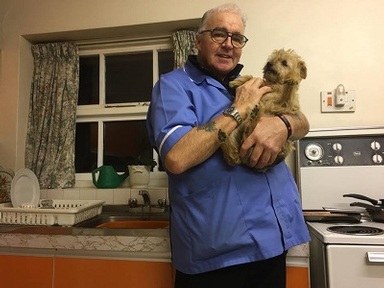Budget cuts and the rise of social media leads to people going online for mental health support
In November it was revealed by mental health charity Mind, that local authorities in England spend just one per cent of their public health budgets on mental health.

The Mental Health Foundation reports that one in four people living in the UK will experience a mental health problem during any given year, costing health and social care services an estimated £21bn annually.
Though public health budgets are stretched, such an underspend on vital services is a cause for concern when one quarter of the UK public will experience a mental health problem each year, this includes the most common mental health disorder in Britain, depression.
Women are more likely to seek treatment for mental health problems than men. Ten per cent of children and young people experience a mental health problem at any one time, while twenty per cent of older people experience depression, often caused by loneliness.
Although a range of support services are currently available, waiting lists are long. This combined with a lack of information being made available by healthcare services and GPs, often due to short appointments means people are looking to the internet as a means of support and information.
The personal cost of mental health problems is immeasurable
Speaking in November about local authority spending on mental health services, chief executive of Mind, Paul Farmer, said: “Having a mental health problem can impact on all aspects of our lives, from our relationships and work to our physical health. The personal costs are immeasurable, and the wider economic cost is huge. Prevention is always better than cure and ignoring the problem simply doesn’t make sense.”
During the Spending Review on 25 November Chancellor George Osborne revealed the Government would be re-investing £600m into mental health services, taking it back to the level it was in 2010, before mental health spending was cut by eight per cent.

The Blurt Foundation is one of several organisations created with the purpose of providing mental health support to people in need, through a confidential, closed Facebook group and its newly established Buddy Box scheme.
Chief executive, Jayne Hardy established Blurt in 2011, following a personal struggle with depression that resulted in her not leaving the house and developing a fear of the telephone. She found the main support options available to her at the time were support groups and telephone counselling, neither of which were a suitable option for her.
Despite looking online, she found there were limited options available to her, and a lack of trusted information about depression, with most information focusing on suicide.
She began writing a beauty blog, following a period of bad self-care. She said: “The blog grew really quickly and thought it felt quite shallow, writing about beauty, despite still feeling depressed, so I started to write about my depression. It became the most read blog post, prompting the most amount of emails and responses from people I didn’t even know.
“From then on it became clear to me that I wasn’t the only one looking for somewhere to talk online, lots of people wanted to talk about their own personal experiences. Then came the idea that I wanted to create a space that harnessed peer support but also educated people to help raise awareness of the illness.”
Drawing on personal experiences to make a difference and provide comfort
Nearly four years later, Blurt Foundation provides 1,000 people with support on a daily basis through their Facebook peer support group and has around 4,000 website hits a day.
The peer support group is a closed, moderated online community, where people of all ages can go to give and receive support with their mental health problems, drawing on their own experiences to make a difference and provide comfort.

Blurt’s peer support group gives its users access to so many different people who do understand and are there around the clock. Every post gets a response, which is important if someone has had the courage to write something in the first place.
Jayne said: “Publicly, young people talk more about mental health and it seems like younger people support us more, but the peer support group is varied in age, and we probably have more older people using it than younger.
“When we first started I thought it might have been more young people, but Facebook seems to be the one social network that is accessible to all ages and that older people do enjoy to use. Likewise, on our main Facebook page, the people who communicate with us on there are older, than many of our users on Instagram or Twitter.
“Aside from the peer support group, we often provide support by email, and our Facebook wall, people do ask for advice on our Facebook posts.”
Blurt launched their self-care subscription box earlier this year in June. Each monthly box is full of products designed to nourish, inspire and comfort, encouraging people to take time out for self-care and learn to relax from their busy lives.
People look online due to the stigma surrounding mental health problems
Speaking about the support that Blurt provide, Jayne said: “I think people are looking online for support alongside visiting their GP or health professional, we encourage people to see their GP as we don’t know someone's medical background and can’t advise on medication. Many of the people in our peer support group have been to see their GP, the services we provide are something people can use as well as support from a healthcare professional.

“I think people look online for support both due to there being such a stigma around mental health problems and a lack of awareness of the types of support available to them.
“Often people can feel that the support isn’t available or that there is a really long waiting list for support services. There is a huge amount of frustration surrounding waiting lists, if someone has been referred to counselling and there is a three month waiting list, it can feel like a lifetime.
“Going online, the support is there instantly and there is something very powerful about talking to people who really understand and have first-hand experiences in what you’re going through.
“It's important to make sure people are aware of the options available to them. Often when you go to the doctors and are diagnosed with depression, you’re not provided with a lot of information, they don’t have much time to see you and you may have complex symptoms.”
The internet can help people access support and information they wouldn’t necessarily have access to or know where to find. Social networks like Twitter can give people a window into the world without having to be fully engaged, however it is important to know how to use them and when to step back.
Jayne added: “I don’t think social networks do enough to protect people from trolling. On Twitter people get reported and not much gets done, and there isn’t much to stop people from creating new accounts.”
Facebook launched a suicide prevention tool in the US earlier this year, whereby people could report a post if they had a concern about the content and mental state of the person posting it and has hosts of contact details available for charities like the Samaritans charities if someone should need them.
Many national charities now offer online support alongside more traditional methods of contact. Mind have their online community, ‘Elefriends’, the Depression Alliance have ‘Friends in Need’, while the Samaritans also offer phone, email and text support.
For more information on The Blurt Foundation, visit: http://blurtitout.org/
The NHS Choices Moodzone offers practical advise and information for people suffering with stress, anxiety and depression: http://www.nhs.uk/Conditions/stress-anxiety-depression/Pages/low-mood-stress-anxiety.aspx
Latest Innovative Care News
 13-May-19
'Pink drink' brain cancer treatment rolled out across NHS in memory of Baroness Jowell
13-May-19
'Pink drink' brain cancer treatment rolled out across NHS in memory of Baroness Jowell
 25-Apr-19
Louis Tomlinson helps 83-year-old who lost wife to dementia complete bucket list
25-Apr-19
Louis Tomlinson helps 83-year-old who lost wife to dementia complete bucket list
 05-Mar-19
Care worker of the year inspires nine-year-old son to work in care
05-Mar-19
Care worker of the year inspires nine-year-old son to work in care
 12-Feb-19
Michael McIntyre's jokes tested to see if they stop elderly catching flu
12-Feb-19
Michael McIntyre's jokes tested to see if they stop elderly catching flu
 25-Jan-19
Ninety-year-old and his dog can stay together, thanks to care worker
25-Jan-19
Ninety-year-old and his dog can stay together, thanks to care worker